Trump’s Jan. 6 Indictment Describes Six Unnamed ‘Co-Conspirators’: Here’s What We Know About Them So Far
- Oops!Something went wrong.Please try again later.
- Oops!Something went wrong.Please try again later.
- Oops!Something went wrong.Please try again later.
While they are not mentioned by name, many clues in the indictment offer insight into which other high-profile figures are being investigated for 2020 election interference
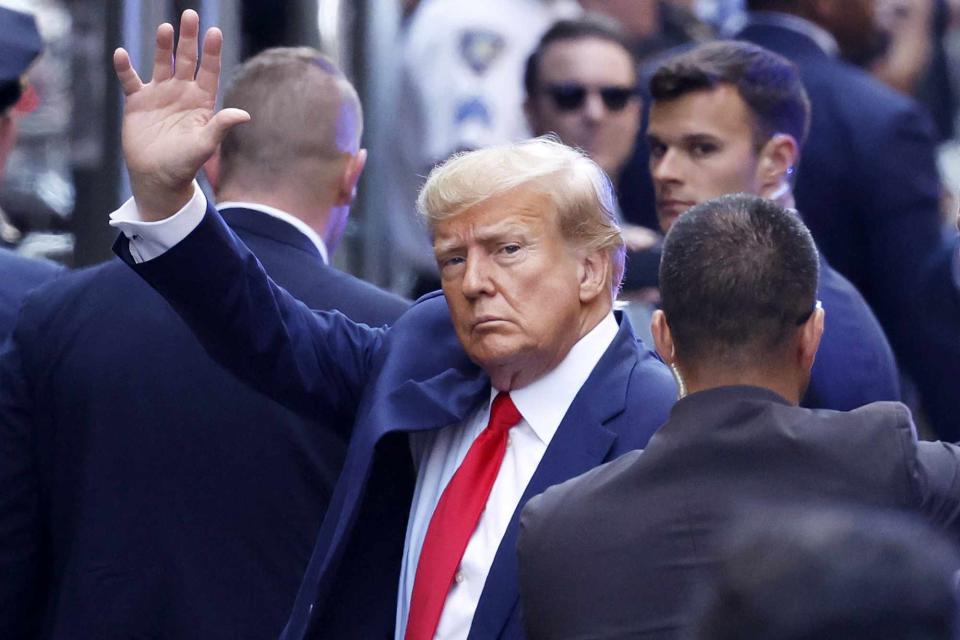
Former President Donald Trump was indicted Tuesday on four criminal counts by a federal grand jury investigating the Jan. 6, 2021, Capitol riot and other efforts to overturn the 2020 presidential election.
In addition to the former president, the indictment lists six co-conspirators, including four attorneys, a Justice Department official, and a political consultant who "helped implement a plan to submit fraudulent slates of presidential electors to obstruct the certification" of votes.
The co-conspirators are not guaranteed to face criminal charges, but as Special Counsel Jack Smith said in a Tuesday evening press conference, "Our investigation of other individuals continues" — a line that suggests further indictments could be in the pipeline.
While they are unnamed, many clues in the indictment offer insight into who prosecutors believe played a role in attempting to overturn the results of the 2020 election.
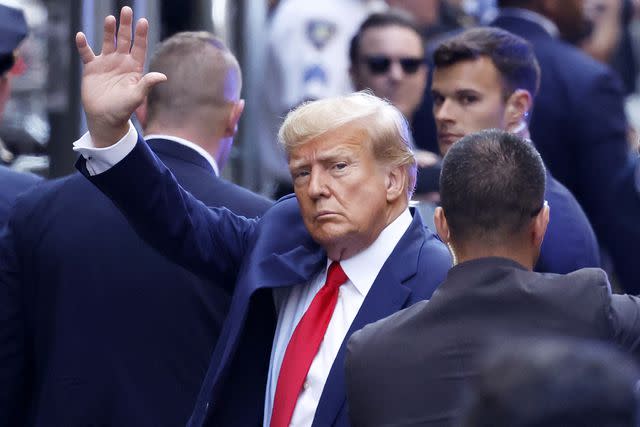
Co-Conspirator 1, an Attorney
Co-Conspirator 1 is described in the indictment as "an attorney who was willing to spread knowingly false claims and pursue strategies that the Defendant's 2020 re-election campaign attorneys would not."
This is widely believed to be Rudy Giuliani, the former mayor of New York City who worked as an attorney for Trump and spent months hosting press conferences and appearing on television and in courtrooms to contest the results of the election.
From the indictment: "Co-conspirator 1 orchestrated an event at a hotel in Gettysburg attended by state legislators," an apparent reference to an event headlined by Giuliani in a Gettysburg, Pa. hotel ballroom in late November 2020.
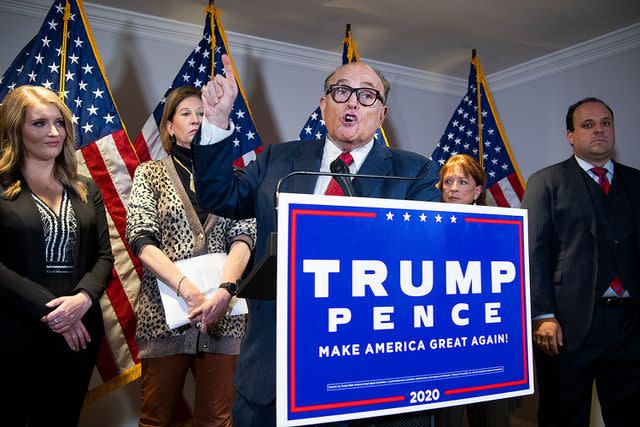
Giuliani was interviewed in the Justice Department's probe ahead of the indictment, but has not been charged himself.
Separately, Giuliani has been a subject of a Georgia special grand jury probe into attempts to overturn the state's 2020 election results for Trump. He is also defending himself against disbarment proceedings in Washington, D.C. and New York, both in direct response to his false election claims.
Related: Rudy Giuliani Now Admits He Made False Statements About Georgia Poll Workers After 2020 Election
Co-Conspirator 2, an Attorney
The indictment refers to Co-Conspirator 2 as "an attorney who devised and attempted to implement a strategy to leverage the Vice President’s ceremonial role overseeing certification proceeding to obstruct the certification of the presidential election."
The indictment later makes reference to a speech given by the unnamed individual on Jan. 6, in which the person made false claims of voter fraud, saying, "We no longer live in a self-governing republic if we can’t get the answer to this question. This is bigger than President Trump. It is a very essence of our republican form of government, and it has to be done."
Those lines are a direct reference to a speech given by John Eastman, who has been a central figure in the investigation into the deadly riots and attempts to overturn the election. A former professor at Chapman University, he has described himself as Trump's attorney who was assisting the then-president in his efforts to prove that the 2020 election was "stolen."
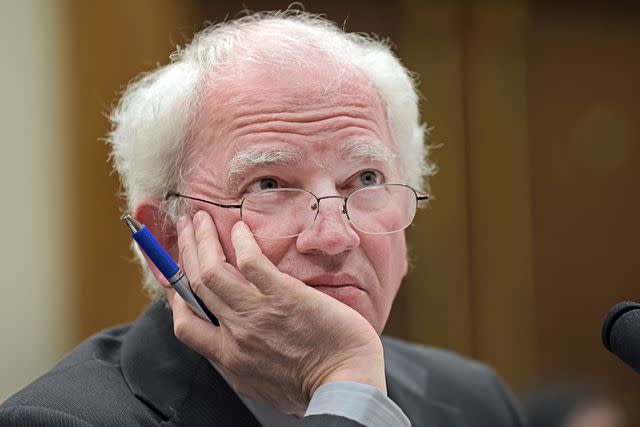
A memo obtained by journalists Bob Woodward and Robert Costa (and cited throughout the indictment) showed Eastman had written a detailed plan to attempt to persuade then-Vice President Mike Pence to throw out the 2020 election results on Jan. 6.
Pence did not, instead releasing a statement hours before Congress met to certify the election for Joe Biden, informing both the president and the public that he didn't have the constitutional power — or any intention — to intervene with the country's vote.
Related: The FBI Has Seized the Phone of Trump Adviser John Eastman
Co-Conspirator 3, an Attorney
Co-Conspirator 3 is described as "an attorney whose unfounded claims of election fraud the Defendant privately acknowledged to others sounded 'crazy'" — a clue that is reminiscent of earlier reports that attorney Sidney Powell was deemed "crazy" by many in Trump's orbit, including the former president himself.
"Nonetheless, [Trump] embraced and publicly amplified Co-Conspirator 3's disinformation," the indictment notes.
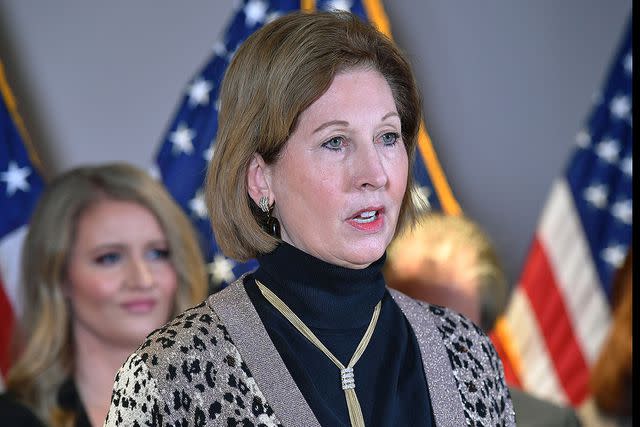
Powell was well-known for the bizarre conspiracy theories she publicly espoused about how Trump lost to Biden. On both television interviews and in press conferences, Powell detailed an alleged scheme of thousands of co-conspirators, involving the major political parties and lasting decades, in which voting systems in the U.S. actually had ties to the late Venezuelan autocrat Hugo Chavez and were in fact secretly capable of switching, creating and destroying massive amounts of votes.
She also mused about the possible role of the Department of Justice and the CIA before being dropped by the Trump team shortly after his electoral loss.
Related: Trump's Legal Team Drops Attorney Who Spread Bizarre Conspiracy Theories of How He Lost to Biden
Co-Conspirator 4, a Former Justice Department Official
Co-Conspirator 4 is described in the indictment as "a Justice Department official who worked on civil matters and who, with the Defendant, attempted to use the Justice Department to open sham election crime investigations and influence state legislatures with knowingly false claims of election fraud."
Many believe that this is former Justice Department attorney Jeffrey Clark, who was acting assistant attorney general for the DOJ's civil division at the time. A lengthy 2021 New York Times report alleged he had "been devising ways to cast doubt on the election results."
Part of that plan allegedly involved making Clark himself acting attorney general, according to the House committee that earlier investigated the Jan. 6 riots.
"In the weeks before January 6th, then-President Trump's appointees at the Justice Department informed the President repeatedly that his claims of election fraud were not supported by the evidence, and that the election was not, in fact, stolen," the House committee wrote in a letter. "Then-President Trump considered appointing Jeffrey Clark as acting Attorney General, as Mr. Clark pressed his Department of Justice superiors to use agency authorities to challenge the election results."
Co-Conspirator 5, an Attorney
Co-Conspirator 5 is described in the indictment as "an attorney who assisted in devising and attempting to implement a plan to submit fraudulent slates of presidential electors to obstruct the certification proceeding."
This could be referring to attorney Kenneth Chesebro. He has not received as much attention as other lawyers in Trump's orbit in the wake of his electoral loss, but documents show he played played a crucial role in a plot to have Trump supporters pretend to be electors from states won by Biden.
In a memo dated Nov. 18, 2020, Chesebro made an argument to have Wisconsin choose its own slate of electors (a responsibility that state law puts in the hands of voters) and submit their votes for the Trump-Pence ticket not by Dec. 8 (which is a deadline laid out in the Electoral Count Act), but by a day that would eventually go down in history: Jan. 6. Chesebro first made his case for the electors for Wisconsin, eventually expanding his proposal for other states.
Chesebro is among those whose testimony was subpoenaed as part of the Georgia grand jury's investigation into Trump's efforts to overturn the state's 2020 election results.
Co-Conspirator 6, a Political Consultant
Co-Conspirator 6 is the big mystery, described in the indictment as "a political consultant who helped implement a plan to submit fraudulent slates of presidential electors to obstruct the certification proceeding."
As Co-Conspirator 6's description could potentially apply to many in Trump's orbit, it's too early to tell who might be the person in question. There are speculations around Virginia "Ginni" Thomas — the wife of Supreme Court Justice Clarence Thomas and founder of a consulting firm — who was found to have pressured Republican lawmakers in Arizona to choose their own electors.
In emails first made public by The Washington Post, Thomas told lawmakers to "stand strong in the face of political and media pressure" and "ensure that a clean slate of Electors is chosen." She sent identical copies of the email to 20 members of the Arizona House and seven Arizona state senators — more than half of the Republican members of the state legislature.
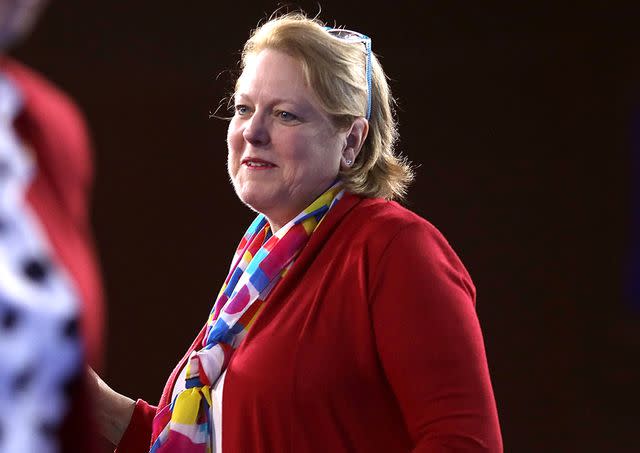
Emails and text messaged obtained by the House committee that investigated the riots also showed that Thomas urged then-White House Chief of Staff Mark Meadows to overturn the results of the 2020 election; and that she was in contact with Eastman, who authored the plan to attempt to persuade Pence to throw out the 2020 election results on Jan. 6.
Some, though, have suggested that Thomas is only garnering attention because of the scandal that would ensue if she was revealed to be Co-Conspirator 6. Other names floating around as possible matches include advisers Steve Bannon, Peter Navarro and Roger Stone, in addition to several more.
In any case, the final conspirator — as with all the others previously mentioned — has not been indicted and is only mentioned in Trump's indictment to add context to the former president's charges.
For more People news, make sure to sign up for our newsletter!
Read the original article on People.

